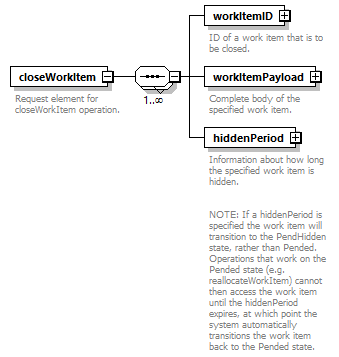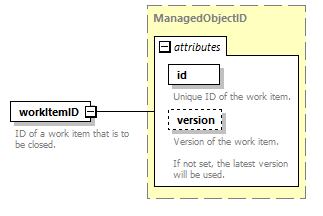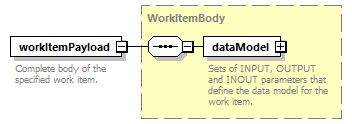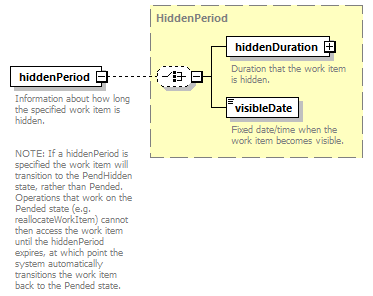| diagram |  |
||
| namespace | http://api.brm.n2.tibco.com | ||
| properties |
|
||
| children | workItemID workItemPayload hiddenPeriod | ||
| annotation |
|
||
| source | <xsd:element name="closeWorkItem"> <xsd:annotation> <xsd:documentation>Request element for closeWorkItem operation.</xsd:documentation> </xsd:annotation> <xsd:complexType> <xsd:sequence maxOccurs="unbounded"> <xsd:element name="workItemID" type="ManagedObjectID"> <xsd:annotation> <xsd:documentation>ID of a work item that is to be closed.</xsd:documentation> </xsd:annotation> </xsd:element> <xsd:element name="workItemPayload" type="WorkItemBody"> <xsd:annotation> <xsd:documentation>Complete body of the specified work item.</xsd:documentation> </xsd:annotation> </xsd:element> <xsd:element name="hiddenPeriod" type="HiddenPeriod"> <xsd:annotation> <xsd:documentation>Information about how long the specified work item is hidden. NOTE: If a hiddenPeriod is specified the work item will transition to the PendHidden state, rather than Pended. Operations that work on the Pended state (e.g. reallocateWorkItem) cannot then access the work item until the hiddenPeriod expires, at which point the system automatically transitions the work item back to the Pended state.</xsd:documentation> </xsd:annotation> </xsd:element> </xsd:sequence> </xsd:complexType> </xsd:element> |
element closeWorkItem/workItemID
| diagram |  |
||||||||||||||||||||||
| type | ManagedObjectID | ||||||||||||||||||||||
| properties |
|
||||||||||||||||||||||
| attributes |
|
||||||||||||||||||||||
| annotation |
|
||||||||||||||||||||||
| source | <xsd:element name="workItemID" type="ManagedObjectID"> <xsd:annotation> <xsd:documentation>ID of a work item that is to be closed.</xsd:documentation> </xsd:annotation> </xsd:element> |
element closeWorkItem/workItemPayload
| diagram |  |
||
| type | WorkItemBody | ||
| properties |
|
||
| children | dataModel | ||
| annotation |
|
||
| source | <xsd:element name="workItemPayload" type="WorkItemBody"> <xsd:annotation> <xsd:documentation>Complete body of the specified work item.</xsd:documentation> </xsd:annotation> </xsd:element> |
element closeWorkItem/hiddenPeriod
| diagram |  |
||
| type | HiddenPeriod | ||
| properties |
|
||
| children | hiddenDuration visibleDate | ||
| annotation |
|
||
| source | <xsd:element name="hiddenPeriod" type="HiddenPeriod"> <xsd:annotation> <xsd:documentation>Information about how long the specified work item is hidden. NOTE: If a hiddenPeriod is specified the work item will transition to the PendHidden state, rather than Pended. Operations that work on the Pended state (e.g. reallocateWorkItem) cannot then access the work item until the hiddenPeriod expires, at which point the system automatically transitions the work item back to the Pended state.</xsd:documentation> </xsd:annotation> </xsd:element> |
WSDL documentation generated by XMLSpy WSDL Editor http://www.altova.com/xmlspy